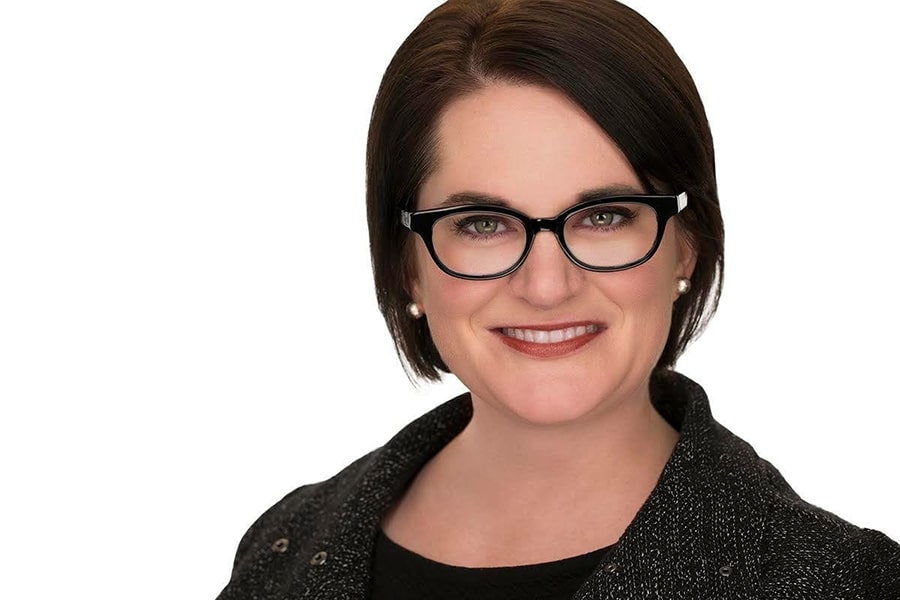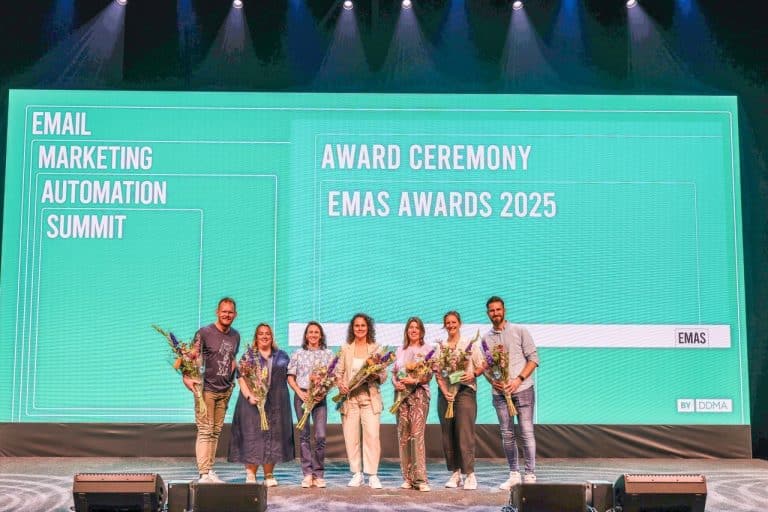Author: Ralph de Kruif, Base Marketeer at Holland Casino

What are you aiming to achieve with Women of Email?
“Our main goal is to empower women and other marginalised groups in the email space. We found out that there weren’t many women speaking at conferences, even though the male to female ratio in the email industry is around fifty-fifty. We discovered that many women didn’t have the confidence for whatever reason to get out and speak at conferences or publish their thoughts on email. ‘I don’t think people would find my work interesting’, they would say. But on the contrary, we discovered that the things women in email are working on are fascinating, but that there just was a big confidence gap. With a bit of support and encouragement and some help in writing conference pitches and abstracts, women are very eligible to speak at conferences. Now, conferences reach out to us frequently to ask for speakers. We essentially make sure that conferences have many intelligent women in the email space they can connect with.”
Looking at email marketing in different parts of the world, do you notice any significant differences?
“Yes. A lot of differences come down to privacy laws. Privacy basically guides the approach of what you can or can’t do in email. In the US, privacy laws are not very strict. I actually wish our government would enforce a law like the GDPR in Europe. We find that some of our strategies are not possible in other places, and they might be seen as not-consumer-focused. Still, many good email strategies are being implemented in the US, but on occasion, some of them would not be legal in other countries.
In Europe, specifically in the Netherlands, there’s a strong valuation of privacy as a fundamental human right, and Dutch marketing reflects that. So one of the things I really love about being connected to a global community is that in Europe, specifically the Netherlands, it has been a social norm to ensure that people have their privacy, even before laws mandated it. So, creating strong CRM strategies and using first-party data in a respectful, permission-based way has been something European countries have been doing for a long time. While in the US, we have larger lists but we’re newer to being more personalised and we’re just now starting to think about privacy on the level that Europeans do on a broader level. So, it’s been exciting to watch to see the sophistication in how Europeans use automation and personalisation but doing it in smaller populations of people that have given permission.
Looking at the position of women in the US, there is not much support for women in terms of maternity care. Your job is protected, but you may not be compensated while you’re out on leave. The decision is up to the company you work for. In the UK, I think it might be a bit better. But in other parts of Europe, it’s just natural for women to have the kind of support they need when they go out on maternity leave, and even paternity leave for fathers. Next to that, there is a high level of sexism. In the US, the industry is very patriarchal in terms of who sits on boards and leads companies. You don’t see a lot of women in senior leadership positions. I don’t live in the Netherlands, but it feels like there’s a lot more natural equality. I’m sure there are issues everywhere, but it feels there’s a lot more support for men and women to be equal in Europe, while in the US, that’s not the case, although it is getting more attention.”
If we’re talking about email marketing, in most cases, it encompasses much more than that. Should we call an email marketer even an email marketer anymore? This year we have changed the name to Marketing Automation Summit, what do you think of the new name?
“Email marketing is typically not just about email but usually also about managing SMS, push notifications and some aspects of web personalisation. I think this is because the email marketer is an expert orchestrator of managing and using first-party data. Wherever you go in the world, the email marketer knows how to take the first-party data in your CRM or database and make it actionable. So I understand the question of email should be called something more than just email. It’s really about delivering good customer experiences, including other channels that can be personalised using first-party data.”
What should be some of the core goals for anybody in email marketing / CRM in your eyes? What are the most important KPI’s?
“If you don’t have people engaged, people will unsubscribe, or worse – hit the spam button. I think the primary goal of email is lifetime value. Brands today, at least in the US, spend a fortune on acquiring customers. But there’s not a lot of focus on retention to drive lifetime value. Then you’re not retaining them long enough to get the money back on initial acquisition investments you’ve made. Many companies are just looking at the money their emails made, but not at a customer level. Even in Europe, companies struggle with measuring lifetime value across channels. I’d love to see it normalised that we’re tracking lifetime value and not just looking at results of individual marketing automations or campaigns. I’d love for us to look at things across the value of what we’re driving, for the consumer and our companies.”
What are the biggest challenges we’re facing within the email marketing industry?
“So as I said, It’s measuring lifetime value and providing privacy, especially in the US. Email is often already seen as spam in the US. People are wondering how they got on lists much of the time, which is terrible. The complexity around privacy is a big challenge as well. You have to put a lot in place to manage privacy and do it in a compliant and legal way. You also have to ensure that customers have a good experience.
Another challenge is that people outside of email (business leaders, tech company executives) don’t understand how powerful email is. When you think about email versus other channels, it has an exceptional job. Messages on other channels like social don’t lend themselves to come back to later when you might have more time to engage. Compared to other channels, the email inbox is a very organised place. Email messages can be organised and triaged, with folders and labels, so if you see an email that interests you, you can save it. Email provides the possibility to come back to messages in an organised way. Other channels don’t offer this type of flexibility.”
Are there any common mistakes every email marketer needs to stop making right now?
“I’d love to see email be more strategic in the way that it’s applied to the customer experience. I don’t know any email marketers that are not drowning in work. They are always busy. Part of the reason is that a lot of hands have to touch it. People have to write and design content. As a result, we spend so much time on execution but not nearly enough time on strategy. This is just the nature of the business, making it just that more challenging to do email marketing well. It’s not the fault of email marketers; it’s just the nature of working in email.”
Within the email marketing industry, we focus a lot on deliverability. We consider a sent email as a success. Shouldn’t we pay more attention to inbox placement to prevent emails from being categorised as spam?
“Yes, absolutely. First of all, deliverability is very confusing and complicated. It isn’t easy and constantly changing. This is because if everyone knew how to ace deliverability, then actual criminal spammers would make it to the inbox too. But coming back to how much email marketers have to manage, they don’t have time to fuss about deliverability. But the single best way to have excellent deliverability is engagement. And to ensure that the subscribers you’re sending your emails to are engaged at a very regular cadence. I think this is where Europe has a leg up because your lists are smaller and a lot more targeted and personalised. In the US, we have lists of millions of people, many of them unengaged. So again, spending more time on strategy and thinking through what is in it for your subscribers is a great way to tackle deliverability.
Another thing that I see, which is a mistake a lot of email marketers make, is that we tell people not to reply to emails. If you allow receiving replies, your deliverability will actually be better. Mailbox providers will see that people respond to your emails and that there is this bidirectional communication flow happening, which looks like your brand is known and that there’s a relationship. I know this causes an operational situation for the customer service team, but it’s also a great way to drive lifetime value, be helpful and support better deliverability.”
Are there any upcoming trends we should pay attention to this and in the coming year?
“Accessibility will definitely be a trend. Dark mode as well, which kind of fits in with accessibility and a wider user experience trend in general. Nowadays, phones, apps and laptops all allow you to use dark mode. Voice in email falls into accessibility as well, which enables people with visual impairments to have their emails read to them. So it will become increasingly important to add HTML text (vs. image text) and ALT text to your emails so they can be read.
Apart from accessibility, brand indicators for messaging identification (BIMI), the evolution of DMARC, where company logos show up in the inbox, will be used more widely. Companies can use it to build another layer of security and trust in their emails.
Finally, I still like to point out AMP, though many people don’t like using it because it’s hard to execute. While AMP may not be the right technology, the concept is fascinating. I hope that the idea eventually leads to engaging experiences, such as subscribers being able to fill in open-ended survey questions right from their emails.”
Next to your role at Women of Email, you work SparkPost. Can you tell anything about Messagebird’s acquisition of SparkPost and what they hope to achieve with it?
“We’re very excited about it. SparkPost and all its capabilities are not going away. We are going to continue the work we’re doing. Our new parent company MessageBird has committed to continuing to invest in email. They were actually a customer of ours before they acquired us, so they see the importance of email for their own business as well.
But the idea of email being tied in the other channels MessageBird offers is an exciting idea. And while I don’t know what it will look like from a product development perspective, we’re very excited about email being elevated alongside a lot of other channels leveraging first-party data, such as SMS and push. We’re really excited about what’s ahead.”
What can visitors expect from your presentation at the DDMA EMAS 2022?
“I’ll bring many great examples of good marketing of different parts of the world and discuss them in the context of the construct of a psychologist, Abraham Maslow. I’ll especially look at these examples through the lens of everything that happened in the past years. It’s been a traumatising time, but I’ve seen many good emails. Email professionals basically were heroes, not on the same level as medical professionals, but in terms of businesses struggling. Many companies unable to invest in advertising put their efforts into email. Email was a workhorse that kept the lights on for many companies and kept customers informed of how to interact with brands. It was fascinating, and it made me proud to see the excellent work from our global community. I’ll share some of those examples and hopefully inspire people as we get back to the new normal, which hopefully is a bit closer to the old normal.”
Ook interessant

Winnaars DDMA EMAS Awards 2025 bekendgemaakt

A digital winter experience for train travelers

